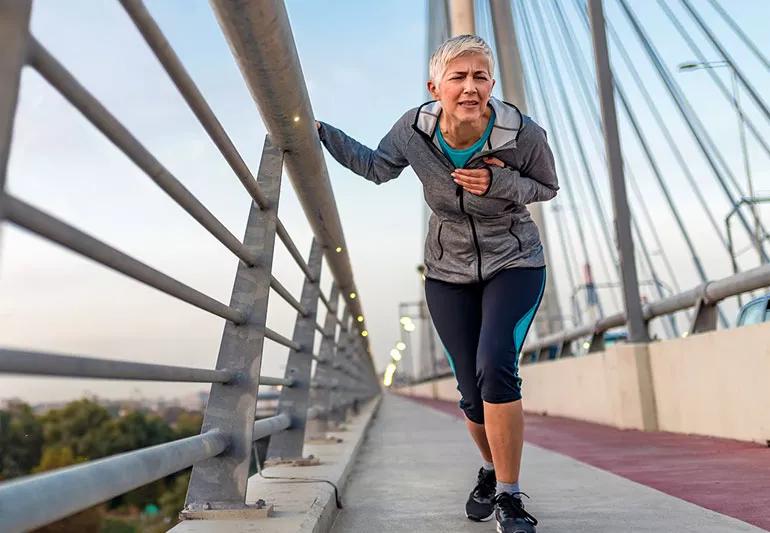Watch out for these lesser-known culprits

Image content: This image is available to view online.
View image online (https://assets.clevelandclinic.org/transform/f42cbb98-6b7f-4331-8b77-1644fa23156c/runningChestPain-1064306846-770x533-1_jpg)
woman having chest pain while running
Most people know about common risk factors for heart attack, including smoking, diabetes, high blood pressure, obesity and lack of exercise. These tend to be universal, meaning they can increase the risk in nearly anyone.
Advertisement
Cleveland Clinic is a non-profit academic medical center. Advertising on our site helps support our mission. We do not endorse non-Cleveland Clinic products or services. Policy
But there are other factors or health conditions that put certain people at risk says cardiologist Steven Nissen, MD. Let’s talk about these lesser-known risk factors and who’s likely to be affected.
Studies have shown that both intense anger and grief can occasionally trigger a heart attack. This most likely occurs because of sudden increases in heart rate and blood pressure that are triggered by strong emotions.
Because many of us experience these emotions throughout our lifetime, they are more likely to negatively impact people who are already at a greater risk for heart attack due to other traditional risk factors.
There is a condition called Takotsubo cardiomyopathy, which may imitate a heart attack, but is somewhat different. It tends to occur more often in women at times of intense emotion and produces heart attack-like symptoms that can cause chest pain that is indistinguishable from a heart attack.
“It may be the result of an arterial spasm,” Dr. Nissen says. “With treatment, the heart function often returns to normal after a few weeks. Later testing generally shows little or no evidence of heart attack.”
A bout of sudden, strenuous physical activity can lead to heart attack in people who are not physically fit.
Advertisement
It can happen from something as seemingly harmless as a pick-up game of basketball, or from a very strenuous activity like shoveling snow.
“People who are not used to exercising, or have traditional risk factors for heart disease, are at increased risk,” Dr. Nissen says.
Cold temperatures cause the arteries to constrict, which can cause a sudden increase in blood pressure. Combine this with physical exertion, and the strain may be too much for some hearts to take. Every year, shoveling snow sends more than 11,000 people to the hospital — at least 7% with heart trouble.
A heavy meal can occasionally trigger a heart attack. No one knows exactly why this happens, but eating does divert blood away from the heart and pushes it toward the GI tract, which be problematic for susceptible individuals.
If you’re at risk for heart attack, it’s a good idea to limit your caloric intake overall and avoid binging on large meals.
When you’re diagnosed with a serious medical condition that seems unrelated to your heart, the risk of heart attack might not cross your mind. For this reason, the role of certain diseases in raising the risk of heart attack is often disregarded.
However, diseases that are known to increase the risk of heart attack include:
Any person with one of these conditions should see a cardiologist, in addition to their regular doctor, Dr. Nissen says.
Advertisement

Delivered every Tuesday!
Sign up for our Health Essentials emails for expert guidance on nutrition, fitness, sleep, skin care and more
It's a letter about the news!
Learn more about our editorial process.
Advertisement
There’s no way to stop it once a heart attack is happening, but the most important thing you can do is to call for help
To help determine what you’re experiencing, focus on how the pain feels, the location of the pain, when it started and how long it lasts
Stopping this critical medication on your own increases the risk of heart attack, stroke and more
Symptoms may be mild, but don’t be fooled — any heart attack is serious
Subtle heart attack warning signs include pressure, cold sweats and fatigue
Sedentary lifestyles are driving up heart attack numbers in the under-40 crowd
Lifestyle choices involving food, exercise, sleep and more can help reduce your risk
Get the answer from an interventional cardiologist
Type 2 diabetes isn’t inevitable with these dietary changes
Applying a hot or cold compress can help with pain
Pump up your iron intake with foods like tuna, tofu and turkey